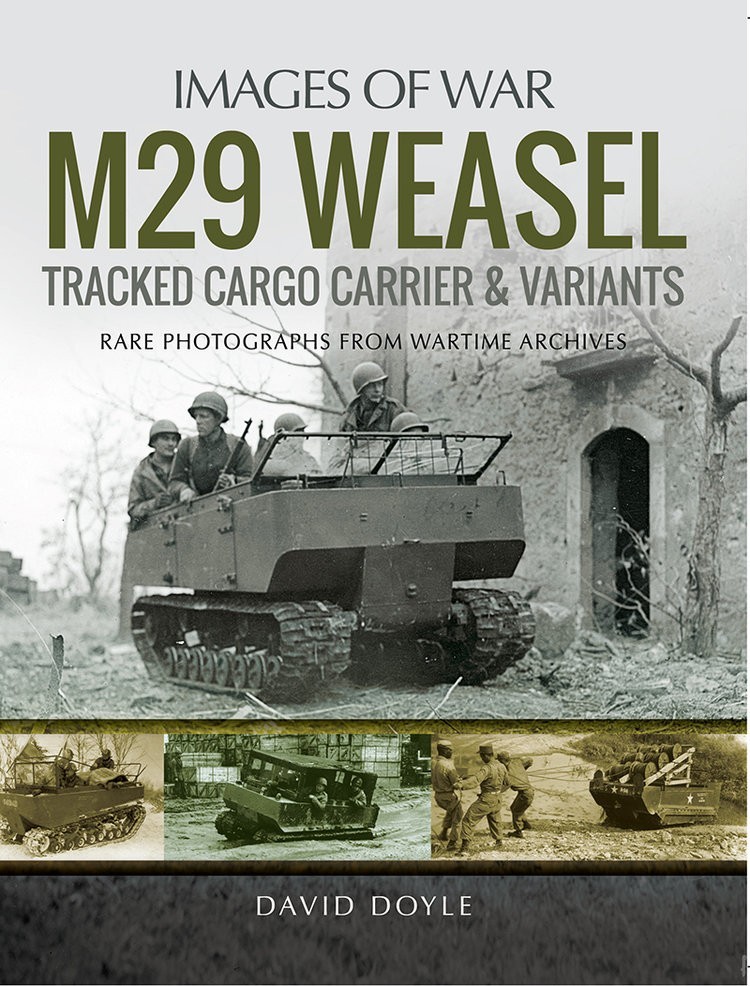Introduction
The M29 Weasel was developed by Studebaker to support Project Plough, a British plan to attack Norway and prevent the Nazis from producing heavy water used in the production of fissionable materials capable of creating an atomic bomb. Designed to operate in snow, a later C variant with buoyancy cells and twin rudders was introduced to operate in water. The M29C saw action in the Pacific and later in Vietnam with the French, who dubbed it the Crabe, and armed it with machine guns and even recoilless rifles. British and Canadian forces also used Weasels, who served on in snowy environments until the 1970s.
The Weasel has been a desired subject for many modelers, and Takom's recent release of both the M29 and the M29C has meant there is a real need for a reference manual. This is especially true given the difficulties many modelers have expressed building the kit.
Well, help has arrived with David Doyle and Pen & Sword having released another in the series "Images of War" covering the Weasel and its several variants.
Contents
This 168-page softcover book includes both period B&W and current walk-around color photos of vehicles, and will be an invaluable aid to modelers of the subject. It is divided into four section plus introduction:
- The T15/M24
- The T24/M29
- The M29C
The Review
One of the reasons why books from David Doyle are at the top of my wish-list for any build I undertake is the fine balance between scholarly research and practical help for modelers. Unlike some vehicle historians, Doyle understands modelers are a big portion of his sales, so his books deal extensively with "walk-around" photos and other aids for turning sometimes vague and simplified kits into show stoppers. This volume is no different, with a scholar's eye for the history and development of the Weasel, insuring readers have a thorough awareness of the path the vehicle took to development. My own interests lead me towards the Vietnam variant M29C, but Doyle makes sure we know how the vehicle began life as a snow bunny. When that objective was dropped by the changes brought to WW2, the Studebaker team pivoted and came up with a smallish motorized carrier and wader.
Because the M29 isn't a tank or other large AFV, small details will really "make" any build. The books photos are perfect for anyone looking to give their build as much life as possible. Modern photos of restored Weasels have detailed captions explaining what each thing on view is: for example, on p. 57 is a close-up of the "leaf spring and the arm linking the top of the bogie yoke to the bracket on the hull." I definitely encourage those building kits of the Weasel to familiarize themselves with its details before applying glue to plastic.
A photo on p. 62 shows the loops and steel retainer cable for the canvas top with the following pages offering inside and interior views of the cover. This might seem like overkill to some, but if you are planning on scratch-building a canvas top, you will appreciate this level of minutiae.
Even though the T24 test model had been intended for use in water, performance left a lot to be desired. The tracks generated water flow, but tended to cancel each other out between forward and aft splashing. Guides were installed, along with a false bow & stern to increase buoyancy (the false compartments evolved to flotation tanks), and the eventual outcome was the M29C. Again, the book shows amazing levels of detail, with over 60 pages of period and modern photos.
The book then winds up with over 20 pages of "in action" shots, followed by an Appendix of data on the vehicle's specs.
Conclusion
Nothing improves a build like having the right reference work. And builds improve when actual photos of the vehicle in the field, in action are available. While abundant photos of some subjects litter the Internet, the Weasel is less well-represented. David Doyle has found many heretofore unpublished photos, as well as detailed "walkaround" color shots that should inspire modelers and assist them in producing interesting builds of this oddball, but important tracked AFV.
Thanks to David Doyle Books for providing this review copy. Please make sure to mention you saw it reviewed on Armorama when ordering your copy.
P. 57: leaf spring and the arm linking the top of the bogie yoke to the bracket on the hull.
p. 62 showing the loops and steel retainer cable for the canvas top.

